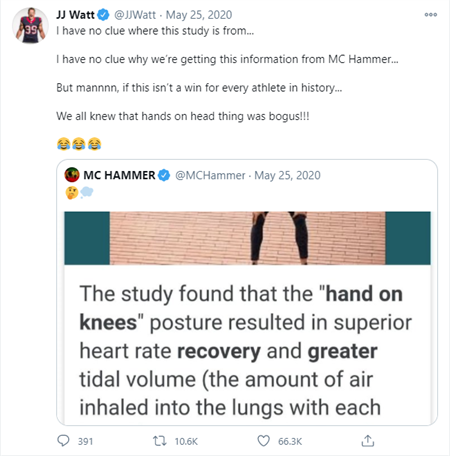John Bartholomew, Ph.D., FACSM |
Jan.
14, 2021
 Translational research is designed to bridge the gap from basic science to practice, and it is not surprising that this research often resonates with a wide audience. Despite this, I was shocked by the response to a paper by Michaelson and colleagues, which has dwarfed the reaction to any previous article in the Translational Journal of the American College of Sports Medicine (TJACSM). It was a relatively simple experiment on the best recovery posture following high intensity exercise – hands on your knees or hands above your head. The data revealed a benefit to hands on knees. While published in 2019, the article and its impact continued to reverberate throughout the athletic community in 2020. It has been met with a tremendous response from athletes around the world who felt vindicated by these data. Apparently, there was near universal preference among athletes to recover with hands on their knees only to be thwarted by coaches who required hands to remain above their head. While this does not address an especially critical public health or performance issue, its reception suggests that it will have a lasting impact. This paper reached the top 5% of articles in Altmetric attention scores (that are derived from the online conversations about the article). This score was largely due to these findings being tweeted by nearly 1,500 users including MC Hammer and Houston Texans athlete JJ Watt– reaching over five million people! It also was shared on group Facebook and Reddit pages and picked up by more traditional media. Even my teenage daughter and her high school friends knew the results!
Translational research is designed to bridge the gap from basic science to practice, and it is not surprising that this research often resonates with a wide audience. Despite this, I was shocked by the response to a paper by Michaelson and colleagues, which has dwarfed the reaction to any previous article in the Translational Journal of the American College of Sports Medicine (TJACSM). It was a relatively simple experiment on the best recovery posture following high intensity exercise – hands on your knees or hands above your head. The data revealed a benefit to hands on knees. While published in 2019, the article and its impact continued to reverberate throughout the athletic community in 2020. It has been met with a tremendous response from athletes around the world who felt vindicated by these data. Apparently, there was near universal preference among athletes to recover with hands on their knees only to be thwarted by coaches who required hands to remain above their head. While this does not address an especially critical public health or performance issue, its reception suggests that it will have a lasting impact. This paper reached the top 5% of articles in Altmetric attention scores (that are derived from the online conversations about the article). This score was largely due to these findings being tweeted by nearly 1,500 users including MC Hammer and Houston Texans athlete JJ Watt– reaching over five million people! It also was shared on group Facebook and Reddit pages and picked up by more traditional media. Even my teenage daughter and her high school friends knew the results!
The social media response raises an interesting question regarding the role of journals in supporting broad dissemination of research: to what extent should journals support this kind of distribution? While many scholars have adopted social media to share and discuss findings, there are those who dismiss engagement with social media as beneath the academic, with the potential to undermine the integrity of research. I would agree that there are concerns if the study is designed solely to seek this wide audience – science should not be conceived to be click bait. But, translational research should be relevant to people’s lives, and I am thrilled to see such engagement with our journal and our field of sport science. At the end of the day, athletes now have the data to counter their coach’s assertions that were based only on tradition. This is, after all, exactly the kind of science-informed practice – if on a small scale – that we hope research plays in our society. We can only fulfill this role to the extent that people are widely informed of our work. Social media provides the most effective means of this kind of dissemination and already has been broadly embraced by most researchers. The challenge is to share our findings in a format that allows for understanding in a condensed form.
These issues are particularly relevant for an online journal like TJACSM. In response, we have begun to feature one article a quarter with an infographic to ease sharing across social media platforms. We also leave open the option for supplemental content (e.g., video abstract or an author’s own infographic) for the same purpose. We are just beginning and have barely scratched the surface of what is possible. As we move into 2021, TJACSM will continue to work to find ways to improve our journal as author-centered and work to ease the publication process and support multiple avenues for sharing research. Read more about the exciting changes happening in this recent blog.
 John Bartholomew, Ph.D., FACSM, currently serves as professor and chair of the Department of Kinesiology and Health Education at The University of Texas at Austin. His research centers on the development of school-based interventions to increase physical activity and the benefits of such interventions for academic performance. Dr. Bartholomew is editor-in-chief of the Translational Journal of the American College of Sports Medicine.
John Bartholomew, Ph.D., FACSM, currently serves as professor and chair of the Department of Kinesiology and Health Education at The University of Texas at Austin. His research centers on the development of school-based interventions to increase physical activity and the benefits of such interventions for academic performance. Dr. Bartholomew is editor-in-chief of the Translational Journal of the American College of Sports Medicine.